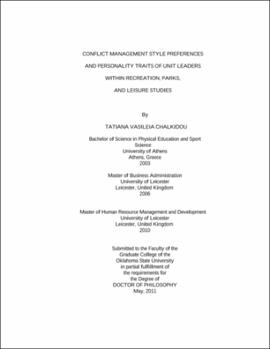| dc.contributor.advisor | Caneday, Lowell | |
| dc.contributor.author | Chalkidou, Tatiana Vasileia | |
| dc.date.accessioned | 2013-11-26T08:34:17Z | |
| dc.date.available | 2013-11-26T08:34:17Z | |
| dc.date.issued | 2011-05 | |
| dc.identifier.uri | https://hdl.handle.net/11244/7341 | |
| dc.description.abstract | Scope and Method of Study: Investigation of conflict management style preferences and personality traits of unit leaders in baccalaureate programs within recreation, parks, and leisure studies curricula. Two hundred sixty unit leaders, which accounted for all the population of unit leaders, were sent the survey through SurveyMonkey. A demographics questionnaire, the Rahim Organizational Conflict Inventory II (ROCI-II) Form C and the NEO Five-Factor Inventory (NEO-FFI) Form S were used for the web-based survey to collect data. This design method integrated elements of Dillman's Total Design Method (TDM) and recent literature on Web-based survey techniques. | |
| dc.description.abstract | Findings and Conclusions: Data were collected yielding a total of a hundred five responses, giving a 40.4 % response rate. Demographics indicated that unit leaders are predominantly male, white, over 41 years old, with quite a long working experience in academia (40% worked more than 11 years up to 20 years, whereas another 53% worked more than two decades up to four decades. The majority of the respondents (63%) had been in the position of the unit leaders up to 6 years. Pertaining to their academic rank, the majority of the unit leaders (n=60, 57%) reported being a Professor; followed by Associate Professors (n=30, 29%), Assistant Professors (n=12, 11%), and "other" (n=3, 3%). Findings of this study led the researcher to conclude that there is evidence to support a relationship between conflict management style preferences and personality traits, which supports previous research that concluded that personality does play an important role in determining conflict behaviors. Findings indicated that unit leaders prefer the Integrating conflict management style, followed by the Compromising, and Obliging conflict management style. Depending on the different variables, the next option would be to dominate the conflict (thus using a Dominating) or to avoid it (using the Avoiding style), or the opposite. Additionally, unit leaders self-rated possessing the following personality traits in order of preference: Conscientiousness, Extraversion, Openness to Experience, Agreeableness, and Neuroticism. All the scores were considered to be "low" indicating, as mid-level managers, they possess "neutral" personalities. | |
| dc.format | application/pdf | |
| dc.language | en_US | |
| dc.rights | Copyright is held by the author who has granted the Oklahoma State University Library the non-exclusive right to share this material in its institutional repository. Contact Digital Library Services at lib-dls@okstate.edu or 405-744-9161 for the permission policy on the use, reproduction or distribution of this material. | |
| dc.title | Conflict management style preferences and personality traits of unit leaders within recreation, parks, and leisure studies | |
| dc.contributor.committeeMember | Lindenmeier, Donna | |
| dc.contributor.committeeMember | Jordan, Debra | |
| dc.contributor.committeeMember | Gates, Gail | |
| osu.filename | Chalkidou_okstate_0664D_11361.pdf | |
| osu.accesstype | Open Access | |
| dc.type.genre | Dissertation | |
| dc.type.material | Text | |
| dc.subject.keywords | conflict | |
| dc.subject.keywords | leisure | |
| dc.subject.keywords | neo ffi | |
| dc.subject.keywords | personality | |
| dc.subject.keywords | recreation | |
| dc.subject.keywords | roci ii | |
| thesis.degree.discipline | Health, Leisure and Human Performance | |
| thesis.degree.grantor | Oklahoma State University | |
